Key takeaways:
- Hospital ministry is vital for providing emotional and spiritual support to patients and their families, enhancing the healing journey.
- Spiritual nurturing practices such as reflection, community engagement, and acts of kindness cultivate well-being and foster connections.
- Daily rituals like journaling and expressing gratitude significantly contribute to personal spiritual growth and emotional clarity.
- Self-care strategies for caregivers, including mindfulness and establishing boundaries, are essential for maintaining mental and emotional health.
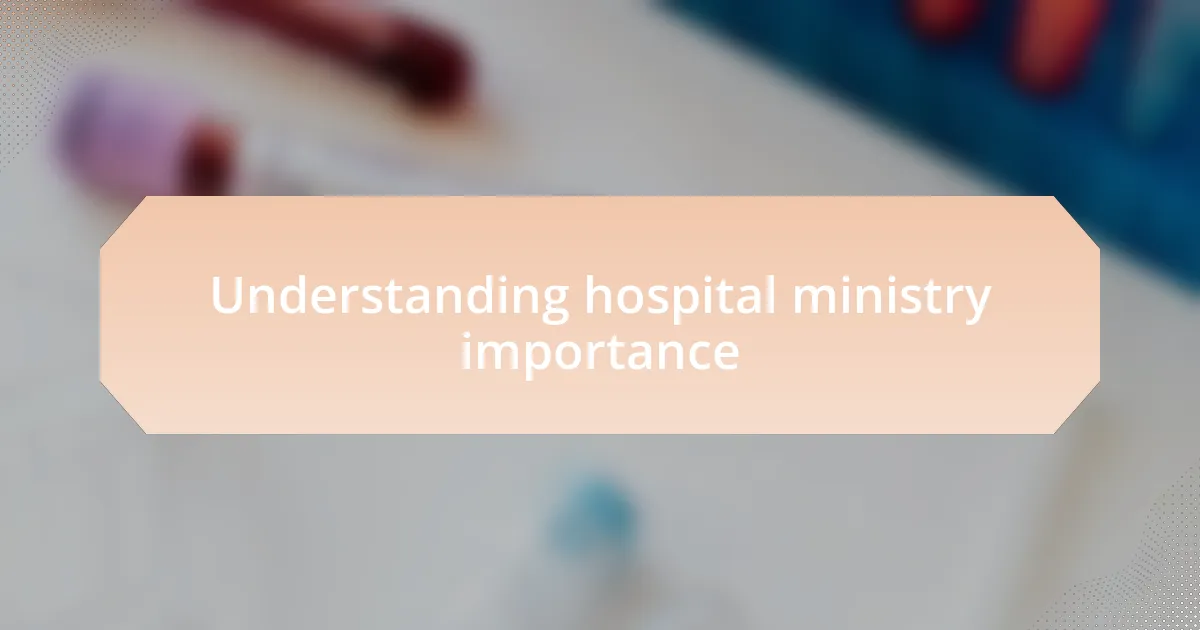
Understanding hospital ministry importance
Hospital ministry plays a crucial role in addressing the emotional and spiritual needs of patients and their families. I remember visiting a friend’s mother in the hospital. She was frightened and in pain, but the presence of a hospital chaplain made a noticeable difference. It’s amazing how just a simple prayer or a few comforting words can provide a sense of peace in such turbulent times.
What often strikes me is how hospital ministry can transform the atmosphere within those clinical walls. I’ve seen how faith-based support allows individuals to confront their vulnerabilities. Have you ever wondered how a few moments of compassionate listening can uplift someone enduring their toughest battles? This emotional connection not only fosters resilience but can also enhance healing.
Moreover, the ministry’s impact extends to the healthcare staff, creating a more compassionate workplace. The presence of spiritual support often encourages a holistic view of care, leading to better teamwork and morale among caregivers. Through my experiences, it’s clear that tending to the spirit can be just as fundamental as addressing physical ailments, enriching the entire healing journey.
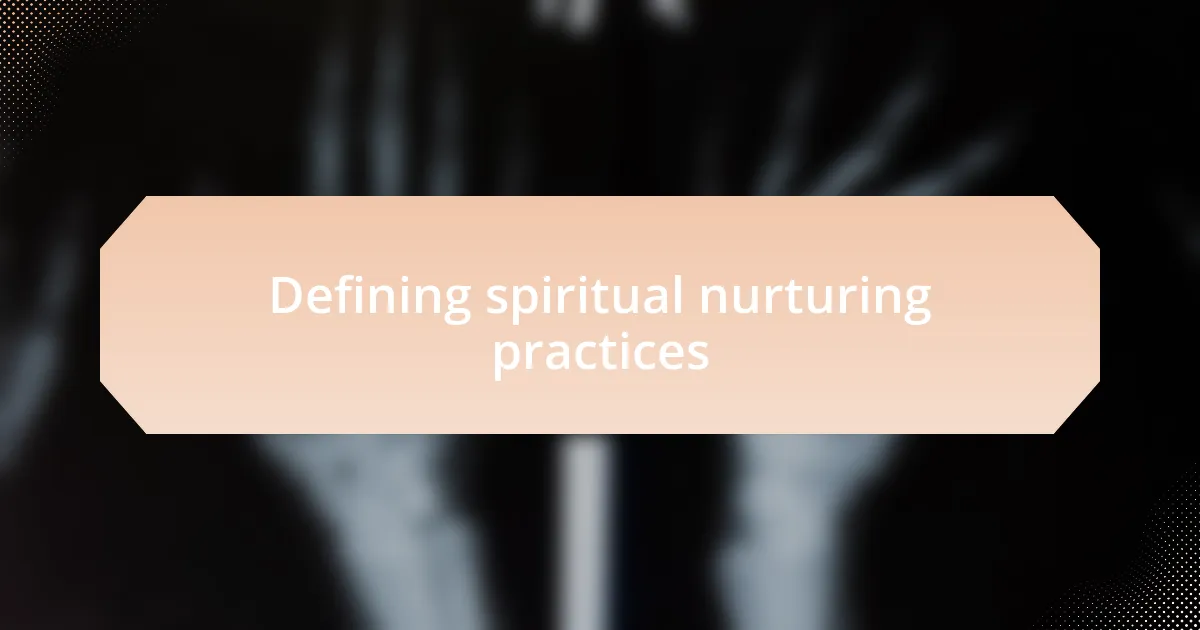
Defining spiritual nurturing practices
Defining spiritual nurturing practices involves recognizing the diverse ways individuals cultivate their spiritual well-being. For me, it often starts with moments of quiet reflection, whether through meditation or simply sitting alone with my thoughts. Have you ever found peace just by taking a deep breath and creating space for contemplation? It’s astonishing how such practices can center us amidst the chaos of daily life.
Engagement with community is another essential practice I value. I’ve often participated in group discussions or faith-sharing sessions, where the exchange of stories and experiences fosters a sense of belonging. This connection not only nourishes my spirit but also reinforces the idea that we’re all in this together. Don’t you think that sharing our journeys can help us heal and grow collectively?
Additionally, integrating acts of kindness into my daily routine has proven to be profoundly nurturing. Whether it’s volunteering at a local shelter or simply lending an ear to a friend in need, these actions remind me of the interconnectedness of our spirits. I often reflect on how uplifting it feels to make someone else’s day a bit brighter. Could it be that nurturing our spirit is as much about how we touch others’ lives as it is about our own?
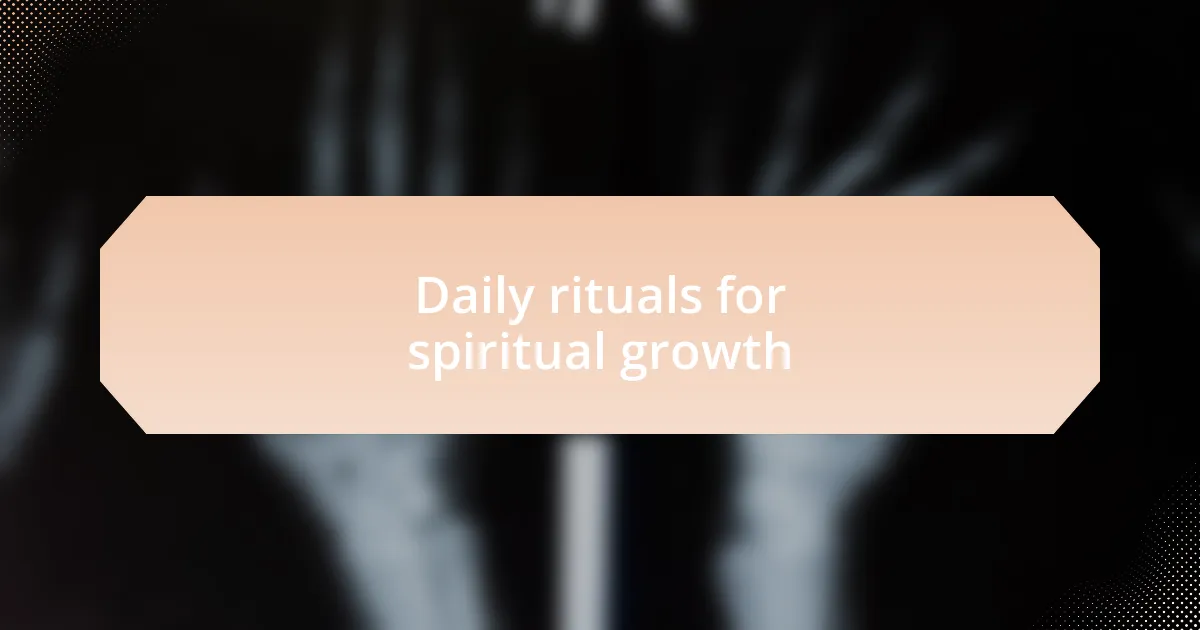
Daily rituals for spiritual growth
Daily rituals serve as the heartbeat of my spiritual growth. Each morning, I dedicate time to read inspiring literature, often passages that resonate with my soul. I remember one morning absorbing a particularly uplifting message; it shifted my entire day. Have you experienced that jolt of inspiration that propels you forward?
I also find that journaling my thoughts and emotions has a remarkable way of clarifying my mind. After a long week, I once took a moment to write about my feelings, and the act itself was cathartic. It brought to light aspirations I had buried and helped me recognize my own growth. Have you tried expressing your inner voice through writing?
Gratitude has become a cornerstone of my daily ritual as well. I take a few moments each night to reflect on what I’m thankful for, which helps me end the day with a sense of peace. I’ve noticed that even in challenging times, recognizing the small joys—like a warm cup of tea or a shared laugh with a friend—can turn my perspective around. Isn’t it amazing how gratitude can reshape our experience of the world?

Building connections with patients
Building connections with patients is not merely a task; it’s an essential part of the healing journey. I recall a day when a patient shared their story of loss with me; their bravery in vulnerability created an instant bond between us. It left me thinking—how often do we overlook the power of simply being present in someone else’s pain?
Making eye contact and offering a sincere smile can be transformative too. I once noticed a patient who had been withdrawn start to open up after I spent just a few minutes engaging them in light conversation. It made me realize that sometimes, it’s the simplest gestures that can break down barriers. Have you ever encountered a moment where a shared smile led to deeper dialogue?
Listening actively to patients is another vital way to forge a connection. I remember taking the time to listen to a recent grad facing a terminal diagnosis; their fears and dreams flooded out, and I felt privileged to be the one they chose to confide in. In those moments, I learned that empathy can be a bridge, allowing both the patient and myself to feel less alone in the experience. How can we better cultivate that space for others?
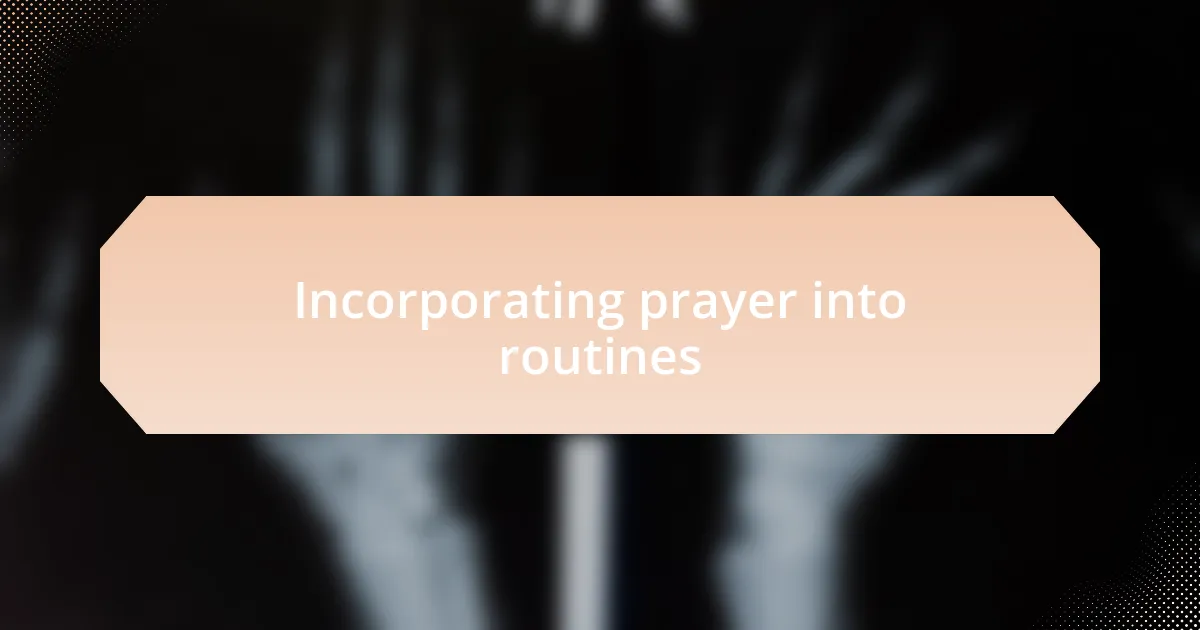
Incorporating prayer into routines
Incorporating prayer into daily routines can profoundly reshape our spiritual lives. I often find that starting my day with a moment of prayer sets a positive tone for everything that follows. Just last week, I took a brief pause in my morning to offer gratitude for the opportunities ahead, and I noticed a renewed sense of focus and purpose throughout my busy day. How could a simple moment of prayer influence your own routine?
During my shifts, I make it a point to pause for prayer between patient visits. This brief interlude not only centers me but allows me to carry the needs of my patients in my heart as I lift them up in prayer. Reflecting on their stories while in prayer deepens my empathy and enhances my connection with them. Have you tried integrating prayer into your work in a similar way?
In the evenings, I often conclude my day with a prayer of reflection, reviewing moments that brought joy and those that were challenging. I find that this practice helps me process emotions, making space for healing. Have you considered how an evening prayer routine might help you unwind and gain clarity about the day’s experiences?
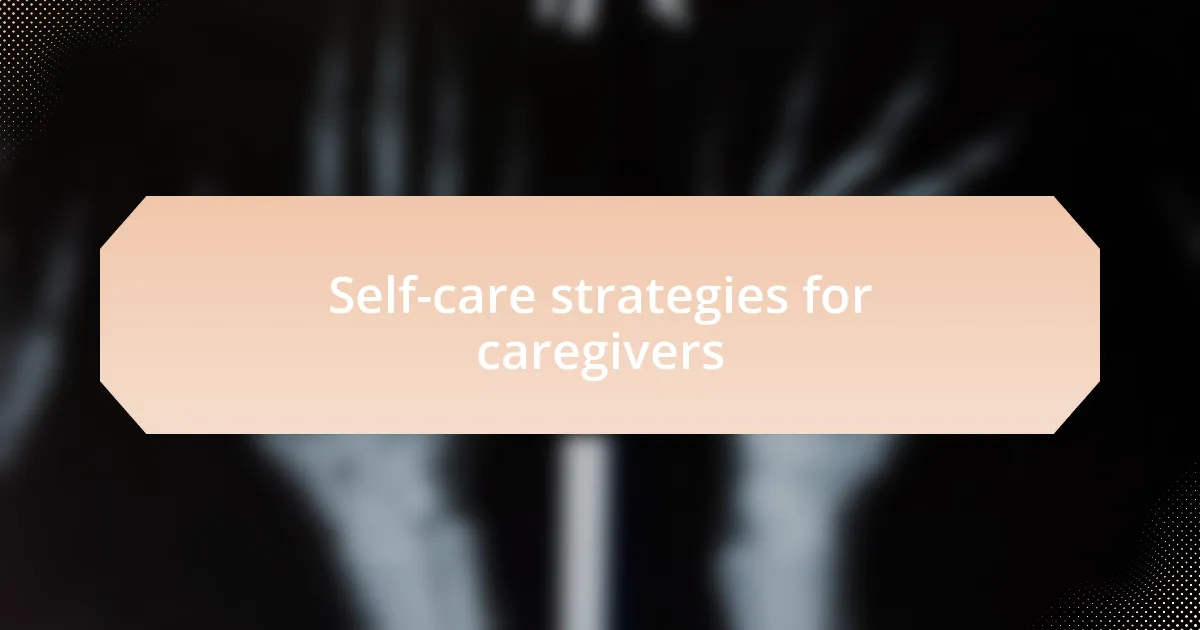
Self-care strategies for caregivers
Amid the demands of caregiving, taking time for self-care is crucial. I’ve started practicing mindfulness during my lunch breaks, which has significantly transformed my mental state. Just last week, I found a quiet corner in the hospital garden, closed my eyes, and focused on my breath for a few minutes. The peaceful ambiance around me helped me feel rejuvenated and ready to face the next shift with renewed energy. Have you explored how a few moments of mindfulness might refresh your spirit during hectic days?
In addition to mindfulness, I’ve found that connecting with colleagues is vital for my well-being. Sharing experiences over coffee not only lightens my heart but also reminds me that I’m not alone in this journey. One day, while chatting with a fellow caregiver, I realized how our laughter could be a form of therapy. It makes me curious about how cultivating these supportive relationships could enhance your resilience as well.
Lastly, I cherish the simplicity of establishing boundaries to protect my time and energy. I experimented with setting a firm end to my workday, which allowed me to leave my responsibilities behind and focus on my personal life. Just a few weeks ago, after sticking to this boundary, I felt an incredible sense of relief wash over me as I stepped out of the hospital. Have you considered the profound impact that boundaries could have on your emotional well-being?

Reflection and journaling for insight
Taking time to reflect and journal has become an integral part of my daily routine. I find that writing down my thoughts helps me clarify my emotions and understand the challenges I face in caregiving. For instance, last month during a particularly trying week, I noted how the weight of responsibilities often left me feeling overwhelmed. Putting those feelings on paper not only released some of that pressure but also allowed me to see solutions I had been overlooking. Have you experienced moments where writing provided clarity in your own life?
Journaling also gives me the chance to celebrate small victories that often go unnoticed in the hustle of daily work. I remember a day when one of my patients, after expressing deep sorrow over their situation, smiled after I simply listened. I scribbled down how meaningful that simple moment was for both of us. Reflecting on these instances helps me appreciate the depth of human connection, even in difficult times. How often do you take a moment to recognize the joys hidden in your caregiving journey?
Moreover, through reflection, I’ve discovered patterns in my emotional responses, which has been invaluable. For example, I consistently find that I feel drained when I’m unable to express my feelings. This insight pushed me to seek outlets, whether through talking with trusted colleagues or engaging in creative endeavors. Understanding these patterns encourages me to make choices that nurture my spirit rather than deplete it. What patterns might you uncover if you dedicated time to reflect on your own experiences?